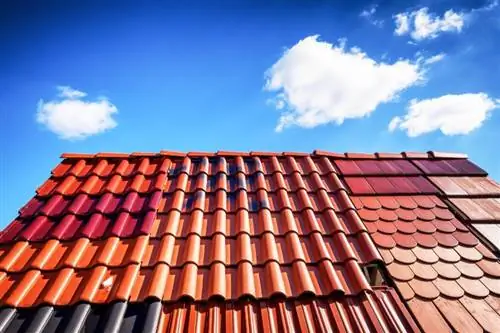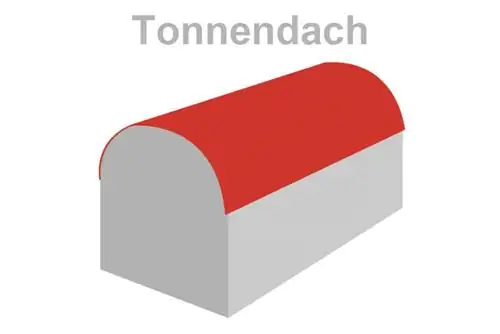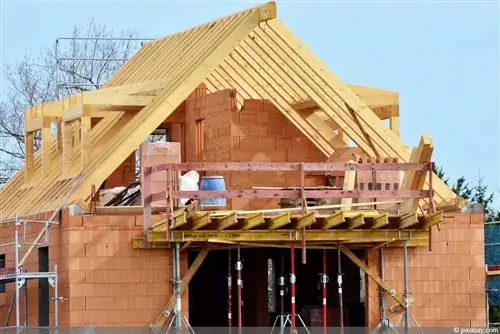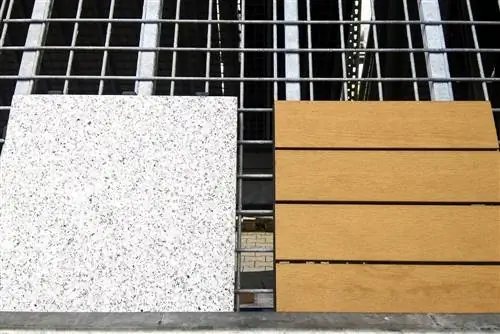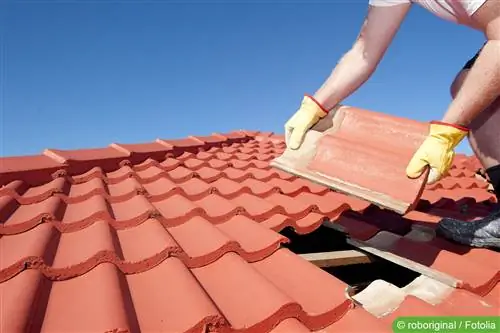- Author admin caroline@plants-knowledge.com.
- Public 2023-12-17 03:39.
- Last modified 2025-06-01 06:48.
The roof forms the upper end of a building and serves both as protection from various environmental influences and for the overall visual design. The wide range of different types of roof tiles offers a solution for every requirement and taste.
Roof coverings in general
Roof coverings are differentiated according to the material. The most important are clay roof tiles, concrete roof tiles, metal profile sheets and bitumen, also known as “roofing felt”. Corresponding properties such as durability, weight or resistance to environmental influences, moss infestation or even dirt deposits are derived from the material.
The selection of roof tile types listed below should serve as a guide for planning your project.
Beavertail roof tiles
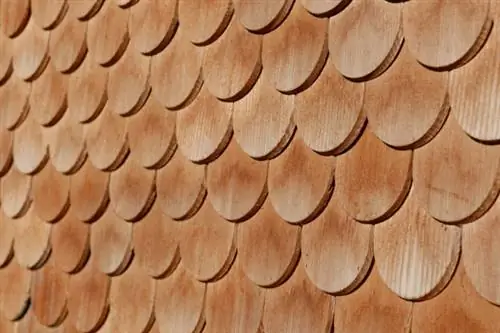
The unusual shape of the plain roof tiles creates a unique overall appearance. They are small, flat and rounded at the bottom. Because of the small dimensions, the number of pieces and the resulting weight are relatively large, which is why the substructure must be very stable. A smaller special form is the Berlin beaver.
- Material: Clay fired
- Shape: upper edge straight, lower edge semi-round, smooth
- color: different colors
- Price: 1EUR per brick, 34 bricks per m²
- Suitable for: 30° roof pitch
Double-trough interlocking tiles
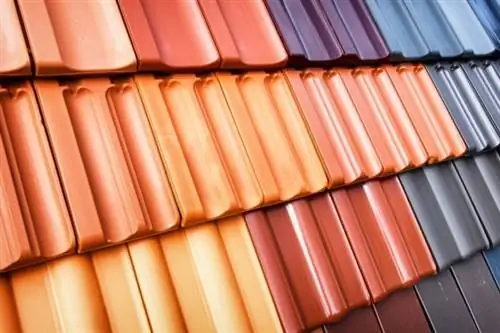
Double-trough interlocking tiles are suitable for the restoration of old agricultural buildings. They were often used in this area because their two troughs drain rainwater very well. A fold at the head end and on the side offers additional protection against water penetration, which is why this type of roof tile is even storm-proof.
- Material: Clay fired
- Shape: rectangular, 2 shallow troughs
- color: different colors
- Price: 2EUR per brick, 14 bricks per m²
- Suitable for: 30° roof pitch
Tip:
Did you know that in some places there are regulations regarding permitted colors of roof coverings? If you're considering an unusual color, find out whether your city has such a regulation.
Three - trough interlocking tiles
Similar to the double-trough interlocking tiles are three-trough interlocking tiles. They also have troughs for water drainage and a fold at the head end and on the side to protect against rain penetration. The additional trough also offers additional width, which is why three-trough interlocking tiles are very suitable for large areas.
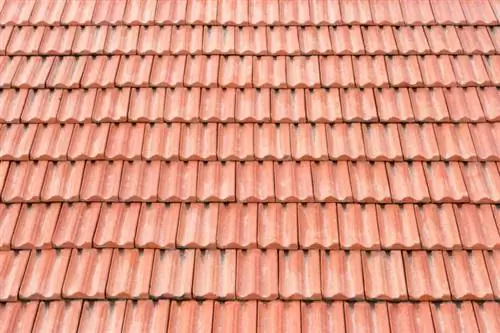
- Material: fired clay, engobed
- Shape: rectangular, 3 troughs
- color: different colors
- Price: 2EUR - 3EUR per brick, 6 bricks per m²
- Suitable for: 22° roof pitch
Flat roof tiles
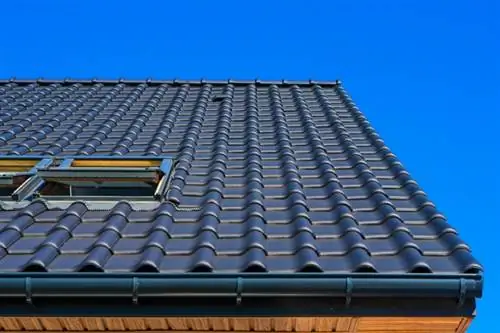
Roofs with a very low inclination (10° - 22°) represent a particular challenge, as rainwater only drains slowly and can penetrate into the substructure. Flat roof tiles are best suited for this type of gable roof. They are curved on one side, which creates channels on the roof through which rainwater flows away reliably.
- Material: Clay engobed
- Shape: rectangular, curved on one side
- color: different colors
- Price: 2EUR - 4EUR per brick, 8 - 9 bricks per m²
- Suitable for: 10° - 22°
Flat tiles/smooth tiles
You can achieve a smooth and modern overall appearance with flat tiles. They have no curvature and the load on the roof structure is very well distributed thanks to the symmetrical shape. However, unevenness that occurs when cutting for roof windows, for example, quickly becomes noticeable.
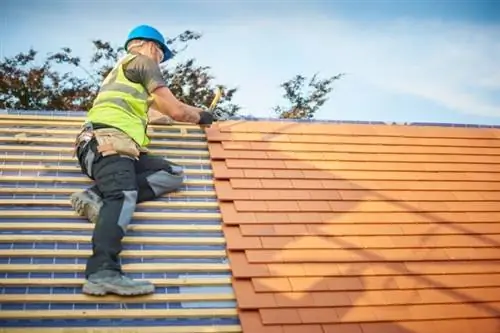
- Material: fired clay, engobed
- Shape: rectangular, flat
- color: different colors
- Price: 2EUR - 3EUR per brick, 10 - 13 bricks per m², increased by cutting effort
- Suitable for: large areas with a roof pitch of 22° or more
Large area bricks
Large roofs face the problem of high material costs. The easiest way to solve this is to use smooth large tiles. The resulting smooth surface appears simple and uniform and can be easily broken up with roof decorations.
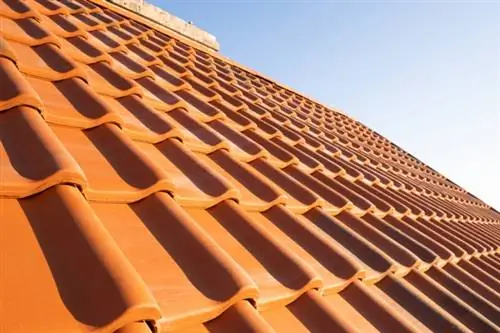
- Material: fired clay, engobed
- Shape: rectangular, smooth
- color: different colors
- Price: 2EUR per brick, 7 bricks per m²
- Suitable for: 22° roof pitch
Frankfurt pan
The most common type of roof tile in Germany is the Frankfurt pan. It has a curved shape and a special coating that repels dirt and growth and strongly reflects sunlight. It is therefore particularly suitable for buildings with a converted attic.
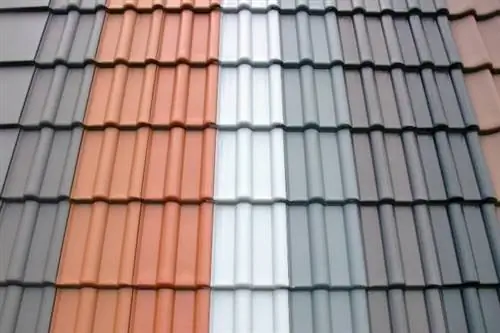
- Material: Clay fired, Protegon
- Shape: rectangular, wave profile
- color: different colors
- Price: 1EUR - 2EUR per brick, 10 - 13 bricks per m²
- Suitable for: 22° roof pitch
hollow interlocking bricks
A simple, elegant overall appearance can be achieved with hollow interlocking tiles. They are slightly curved and have a trough for water drainage. Since they can also be used with a roof pitch of less than 22°, they are real all-rounders and are suitable for both new buildings and the renovation of older buildings.
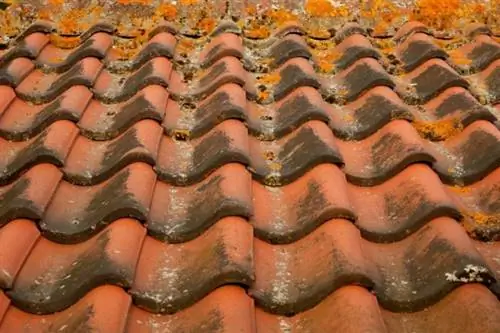
- Material: Clay fired
- Shape: arched, 1 hollow
- color: different colors
- Price: 2EUR per brick, 13 bricks per m²
- Suitable for: 22° roof pitch, possible from 10°
Hollow bricks
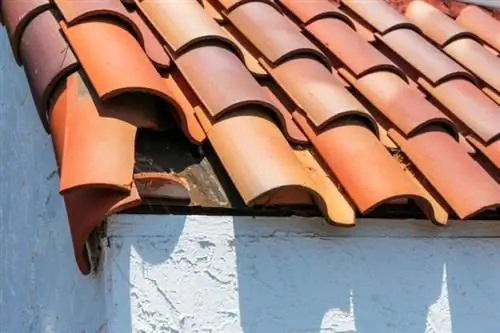
Hollow bricks are suitable for the renovation of listed buildings, especially in northern Germany. They have a curved shape and have no fold, which is why they should only be installed by an experienced roofer. The large variety of variants of this type of roof tile results in various areas of application, e.g. B. for dormers, as a ridge or for playful monk-nun sections.
- Material: Clay fired
- Shape: rectangular, curved
- color: different colors
- Price: 1EUR per brick, 9 - 15 bricks per m²
- Suitable for: 22° roof pitch
Reform bricks
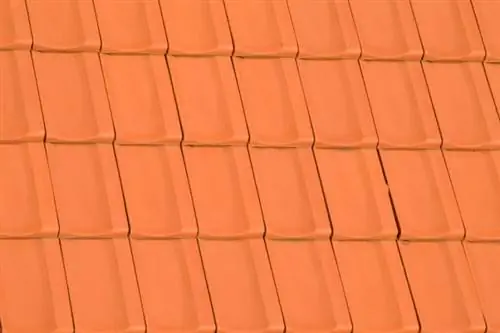
This simple type of roof tile has a flat, wide trough for water drainage and is a modern development of the flat tile. Their large displacement range makes them very suitable for renovation work.
- Material: fired clay, engobed
- Shape: rectangular, shallow hollow
- color: different colors
- Price: 2EUR per brick, 10 - 12 bricks per m²
- Suitable for: 30° roof pitch
S - pan
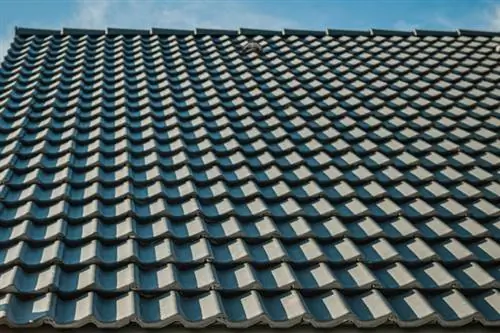
This type of brick has an S-shaped curved shape and creates a soft, wave-like overall impression. In addition to covering the entire roof, you can also use the S pan to integrate existing roofing as a passage tile for antennas, cables or pipes.
- Material: fired clay, engobed
- Shape: rectangular, S-shaped
- color: different colors
- Price: 1EUR - 2EUR per brick, 10 bricks per m²
- Suitable for: 22° roof pitch
Tip:
Discuss your project with a roofer and have him carry it out. This way you avoid unpleasant surprises and additional costs. You can reduce the price by carrying out the agreed preparatory work yourself.
Frequently asked questions
What is engobed?
Engobizing is a sealing process in which the brick is covered with liquid clay, similar to glazing. Among other things, it is used for coloring.
Why are many roofs red?
Roof tiles are made of fired clay, which contains iron. This iron content oxidizes during firing and produces the natural red color of the bricks. This is covered by coating processes such as engobing or glazing.
Why are all bricks made of clay?
This is due to the definition of the word “roof tile”. Roof coverings made of clay are called tiles. Those made from other materials have different names. The presented species are also available in other materials.

